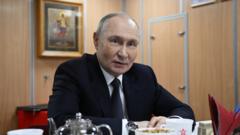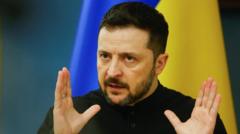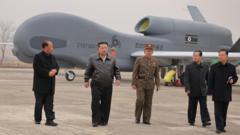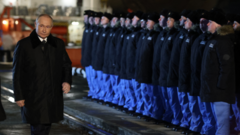President Zelensky hailed a diplomatic step forward with the US and an agreement to address naval safety and energy strikes in Ukraine. However, Kremlin's added conditions on sanctions and trust issues raise concerns over long-term effectiveness and implementation of the ceasefire.
Fragile Progress in Ukraine: Ceasefire Agreement Lacks Guarantees
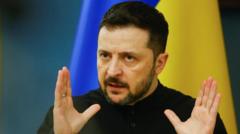
Fragile Progress in Ukraine: Ceasefire Agreement Lacks Guarantees
After negotiations in Saudi Arabia, US, Russia, and Ukraine outlined agreements for a potential naval ceasefire and energy strikes pause, but uncertainties persist.
Amid protracted conflict and extensive negotiations in Saudi Arabia, a nuanced agreement has emerged involving the US, Russia, and Ukraine. President Volodymyr Zelensky expressed cautious optimism over outlines from the discussions that primarily aimed to enhance conditions for navigation in the Black Sea and mitigate attacks on energy infrastructure. The US and Ukraine agreed to instate immediate ceasefires while Zelensky voiced regret over a lack of explicit protections for civilian infrastructure.
However, the dialogue encountered complications with a concurrent Kremlin document introducing additional preconditions. Russia's conditions included the lifting of sanctions on its banking and export sectors, positioning the ceasefire not merely as an end to hostilities but as a catalyst for broader economic concessions. The feasibility of these demands complicates the potential resurgence of the Black Sea Grain Initiative, previously abandoned by Russia due to unresolved grievances.
Challenges remain in the practical application of the agreement; for instance, any substantial easing of sanctions may hinge on European Union approval. Moreover, the Kremlin's stipulation of a backdated 30-day pause could face interruptions should either party breach the terms. Despite this tentative agreement, the overall climate of skepticism pervades, as both sides harbor deep-rooted mistrust, and the possibility of achieving a more comprehensive ceasefire remains tenuous.
Ultimately, understanding the efficacy of this agreement will depend on the subsequent behaviors of both parties. Observers of the conflict now await to see if the fresh diplomatic overtures translate into sustainable peace efforts or if both nations will revert to prioritizing military advantages over meaningful negotiations. The road ahead is long and fraught with uncertainties, making clear that ceasefires are often intricate processes shaped by subsequent actions rather than singular declarations.








